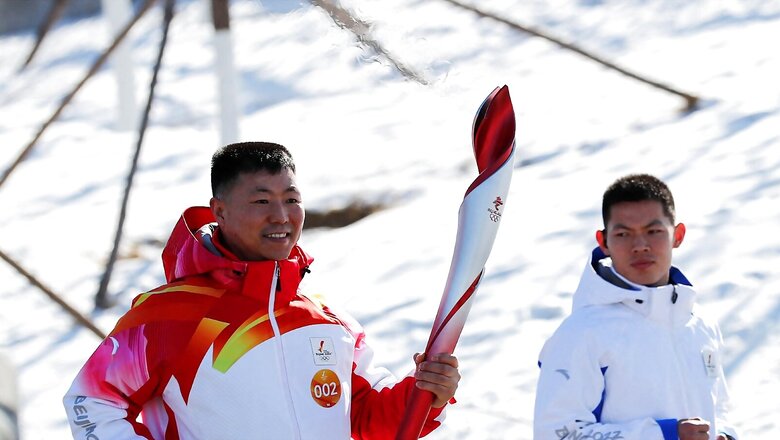
views
A day before the opening ceremony of the Beijing Winter Olympics, India announced a diplomatic boycott of the opening and closing ceremonies. Arindam Bagchi, spokesperson for the Ministry of External Affairs, said: “The Chargé d’Affaires of the Embassy of India in Beijing will not be attending the opening or the closing ceremony of the Beijing 2022 Winter Olympics.”
This was in response to an immediate provocation by the Chinese side that opened up the Galwan wound. Chinese state-run Global Times published a picture of a People’s Liberation Army (PLA) commander who was involved in the Galwan Valley clashes, carrying the Olympic torch. Qi Fabao, who was the regimental commander of the PLA’s Xinjiang military command, sustained “head injuries” during the clashes in June 2020, as per the Global Times.
The report described him as a “hero” who took the torch from Wang Meng, China’s four-time Olympic short track speed skating champion, and the two “made military salutes to each other” during the exchange.
India called the move by China “regrettable” and stated that Beijing had “chosen to politicise an event like the Olympics”, owing to which India would be diplomatically boycotting the Winter Olympics.
India had lost 20 soldiers in the bloody clashes in the Galwan Valley as the soldiers were undertaking a verification exercise to ensure that China removed its non-permanent structure from the area since the two sides were engaged in a friction in eastern Ladakh. Though China has never revealed the actual number of its casualties, an Australian investigative report in The Klaxon pegged the Chinese casualties at 38 and Russia news agency TASS had estimated that China suffered more than 40 fatalities.
Nonetheless, with an ongoing friction which hasn’t been resolved for over 20 months, despite over a dozen military level talks and almost an equal number of diplomatic level talks, Qi Fabao being handed the Olympic torch just added to the bad blood.
In his farewell call in December last year with Chinese state councilor Wang Yi, India’s former Ambassador to China Vikram Misri had said that certain challenges since 2020 had overpowered the vast opportunities in the relationship. However, he was hopeful that with continued communication at all levels – political, diplomatic and military – the two sides would be able to resolve the current difficulties and take the relationship forward in a positive direction.
Within a month of that expression of optimism, China’s torch provocation has once again turned things around. Pradeep Kumar Rawat is India’s next ambassador to China and is yet to take charge.
India’s Chargé d’Affaires is Dr Acquino Vimal and he was officially sent the invitation for the Beijing Olympics ceremonies. However, he will not be attending them. Subsequently, India’s public broadcaster Prasar Bharati announced it won’t be airing the opening and closing ceremonies live on its sports channel either.
Significantly, India’s decision has come weeks after some Western nations, led by the US, declared a diplomatic boycott of the Winter Olympics. However, it is prudent to note here that the official reason stated for their boycott is human rights violations against Uighur Muslims in Xinjiang.
On the other hand, leaders of both Pakistan and Russia will be present at the opening ceremony. Russian President Vladimir Putin has indicated that this is to display the unity of these countries against the West. The Russian side, however, had also been quick to clarify that President Vladimir Putin would not hold any bilateral meetings with visiting dignitaries. Behind Putin’s move could be increasing curiosity and concern over an alliance between China, Pakistan and Russia over Afghanistan.
When a senior government source was asked about this coming together of the three over Afghanistan, the official said that Russia had been actively engaging with India, too, on Afghanistan. The visit of the Russian NSA twice in two months to meet Indian counterpart Ajit Doval last year was quoted to push the argument that Moscow was not doubted in its intention by New Delhi on Afghanistan.
Later last year, President Putin himself made a rare visit during the Covid-19 pandemic to India. Even though the visit lasted only six hours, the messaging in terms of the prevailing situation was considered vital.
But the growing proximity between Beijing and Islamabad has often been under the scanner. Pakistan has been using the backing of its all-weather friend China against India on many occasions. The most prominent move recently was the push to internationalise the issue of Kashmir by raising it at the UN Security Council.
After the abrogation of Kashmir’s special status, China, a P5 member, sought a closed-door discussion on the issue of Kashmir. The most obvious reason was a nudge from Pakistan. However, some believed that China had its own axe to grind over the reference to Aksai Chin by Home Minister Amit Shah in his Parliament speech. Beijing used Kashmir as an excuse to corner India at the United Nations.
In fact, China had officially raised an objection to the reference to Aksai Chin. In days after the dilution of Article 370 that granted special status to J&K, the External Affairs Minister had even travelled to Beijing to clarify India’s position on the matter. “India was not raising any additional territorial claims. The Chinese concerns in this regard were misplaced,” Dr S Jaishnakar had said.
The external affairs minister had told the India media in Beijing that China had raised the issue of Aksai Chin during the meeting.
Pakistan’s dependence on China on the geopolitical front to target India has also meant that China, too, is using Pakistan in turn. Case in point is the China-Pakistan Economic Corridor (CPEC), a flagship project under Xi Jinping’s ambitious Belt and Road Initiative.
Apart from the fact that CPEC lies in Pakistan-occupied Kashmir and India has objected to it, many believe Pakistan could be turned into a virtual colony of China due to the project.
There was reportedly a rethink on the project when Imran Khan took over because it was viewed as being heavily in favour of China with tax breaks and other benefits that Chinese companies enjoyed. However, the thought was soon brush aside. Pakistan may be wary of the debt-trap some countries seeking Chinese investment like Sri Lanka have been entangled in. However, its dependence on China for countering India clearly means it’s impossible for Islamabad to tick Beijing off.
So much so that Pakistan, an Islamic country, has never questioned China over the gross human rights violations of Uighur Muslims. Imran Khan has on several occasions skirted questions on Xinjiang, virtually giving a clean chit to China.
The growing proximity of Pakistan and China was raised by Congress leader Rahul Gandhi, too, in a bid to corner the government in Parliament. He blamed the Narendra Modi government’s policies for driving them closer. The charge has been vehemently denied by the government, the counter-attack being led by External Affairs Minister S Jaishankar himself.
Jaishankar tweeted to highlight that even during the Congress party’s tenure, Pakistan’s proximity to China was visible. “Rahul Gandhi alleged in Lok Sabha that it is this Government which brought Pakistan and China together. Perhaps, some history lessons are in order: In 1963, Pakistan illegally handed over the Shaksgam valley to China. China built the Karakoram highway through PoK in the 1970s.”
Rahul Gandhi alleged in Lok Sabha that it is this Government which brought Pakistan and China together.Perhaps, some history lessons are in order:-In 1963,Pakistan illegally handed over the Shaksgam valley to China.
-China built the Karakoram highway through PoK in the 1970s.
— Dr. S. Jaishankar (@DrSJaishankar) February 2, 2022
China’s most ambitious project, the Belt and Road Initiative, was officially started under Xi Jinping in 2017. Despite India boycotting the summit attended by leaders and officials of around 130 countries, the CPEC project through PoK continues. Incidentally, India boycotted that gathering too just a day before the summit. In its statement India had said: “Connectivity projects must be pursued in a manner that respects sovereignty and territorial integrity.”
Similarly, India continues to deal with the friction in eastern Ladakh and the reason for it has eluded even the top foreign policy brass. More than a year after the friction started, Jaishankar said in November 2021 in Singapore that China has given no “credible explanation” for violating the border protocols and agreements with India.
In December 2020, while speaking at an event, he said that India is “today probably at the most difficult phase of our relationship with China, certainly in the last 30 to 40 years or you could argue even more”.
India’s challenge vis-à-vis its neighbour has been a long-standing one. From Nehru to Modi, even though the leaders seem to have taken measures to improve ties with Beijing, the response from the other side has, more often than not, left India perplexed with a sense of betrayal.
Read all the Latest News here











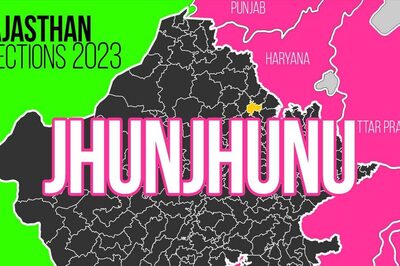


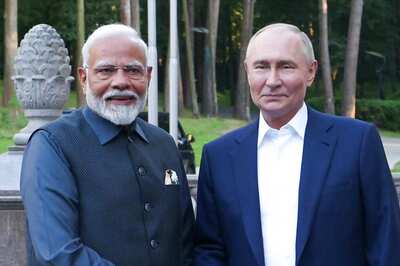

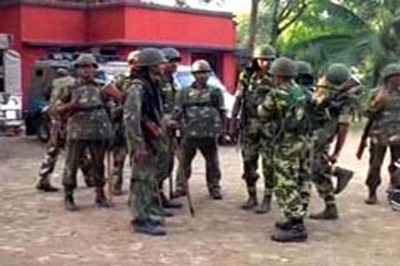

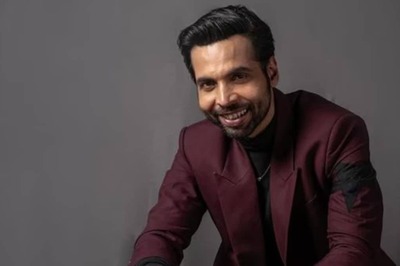
Comments
0 comment